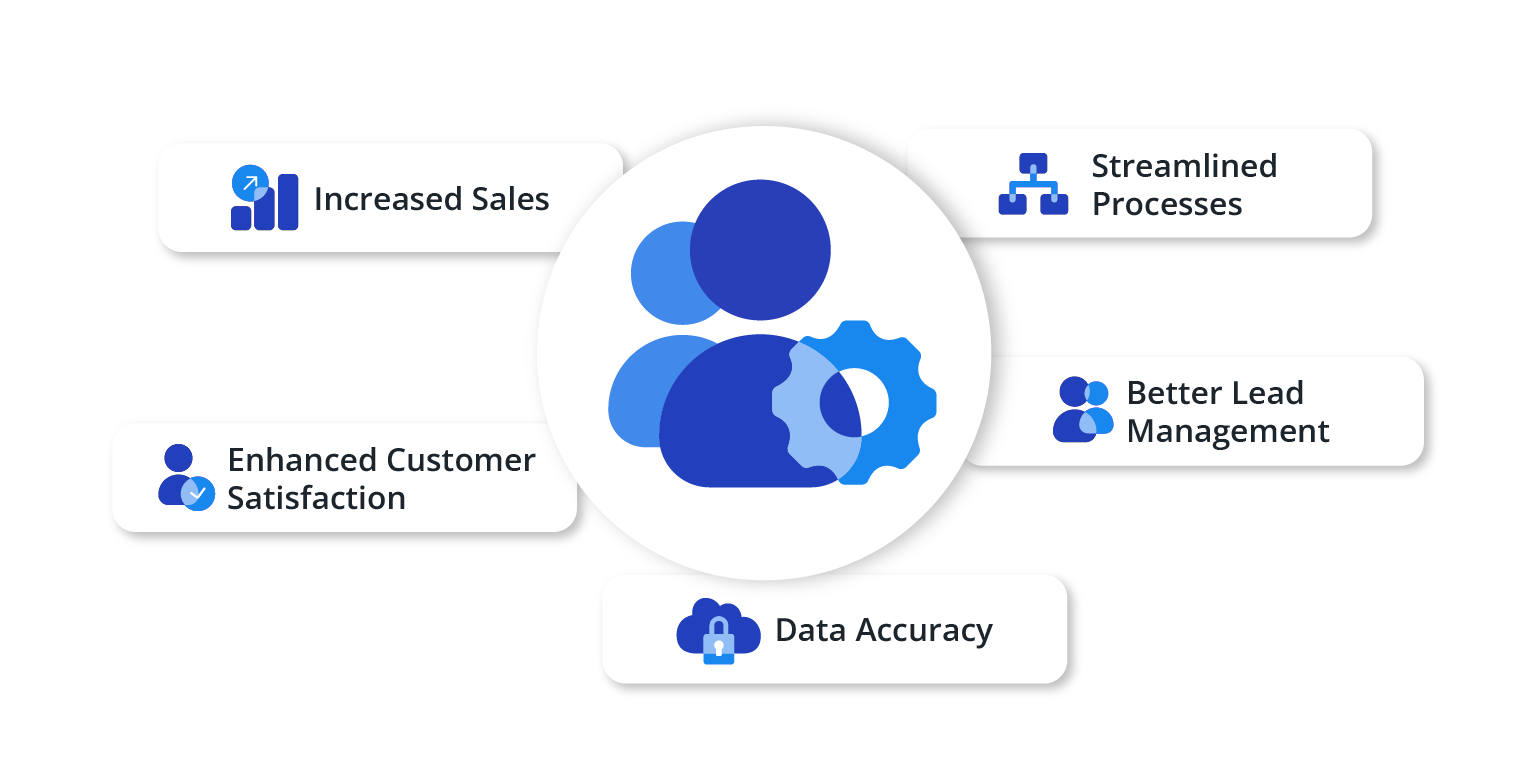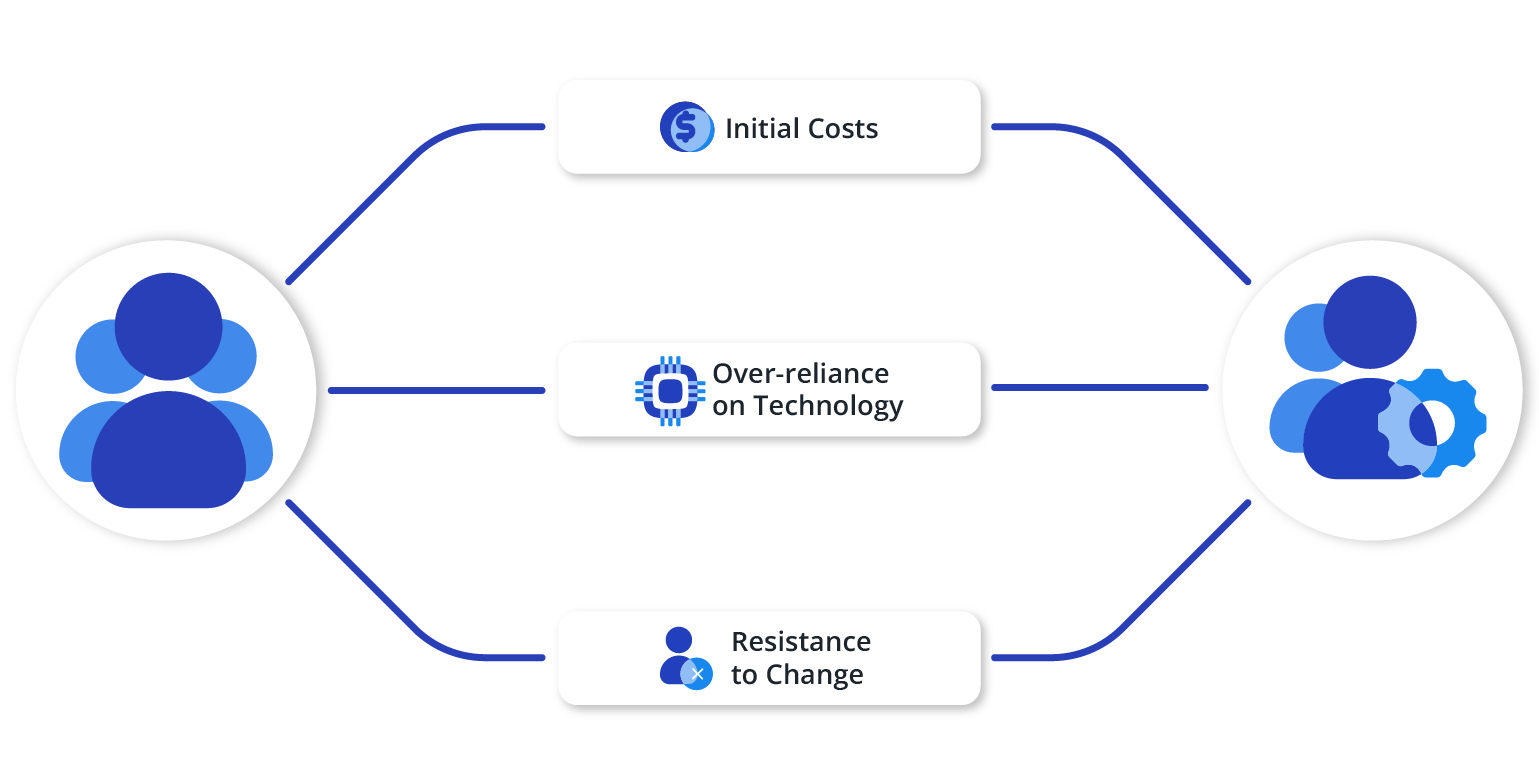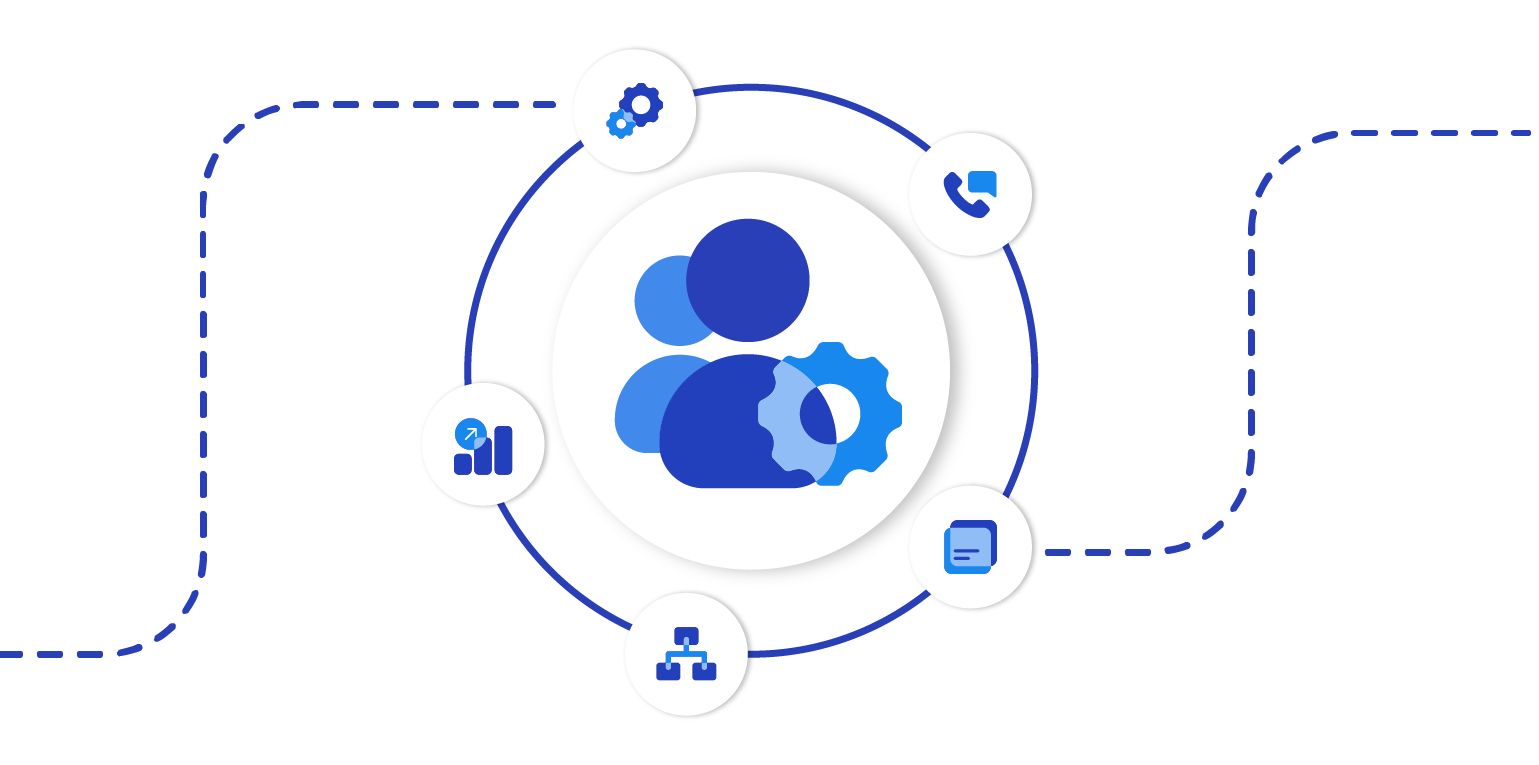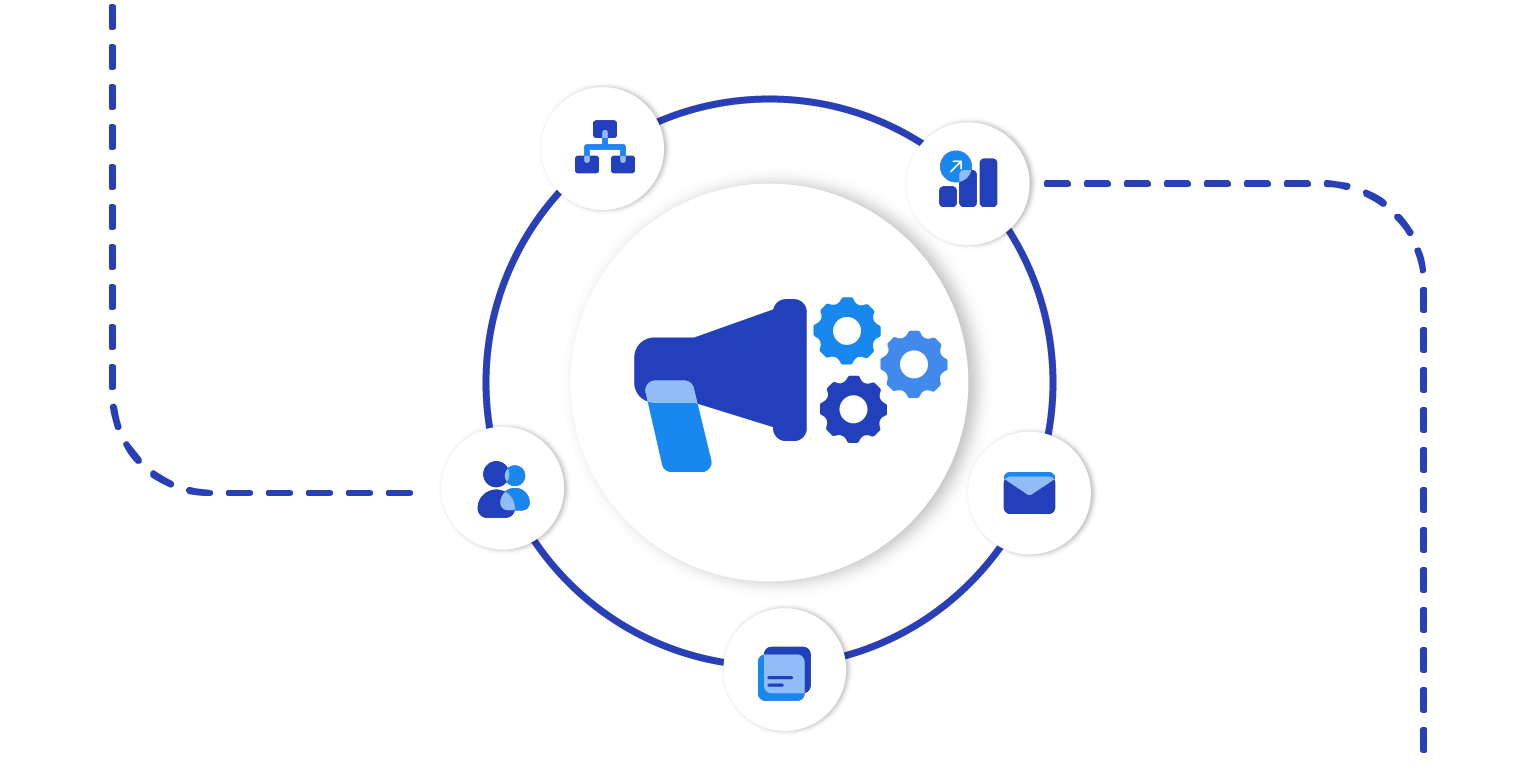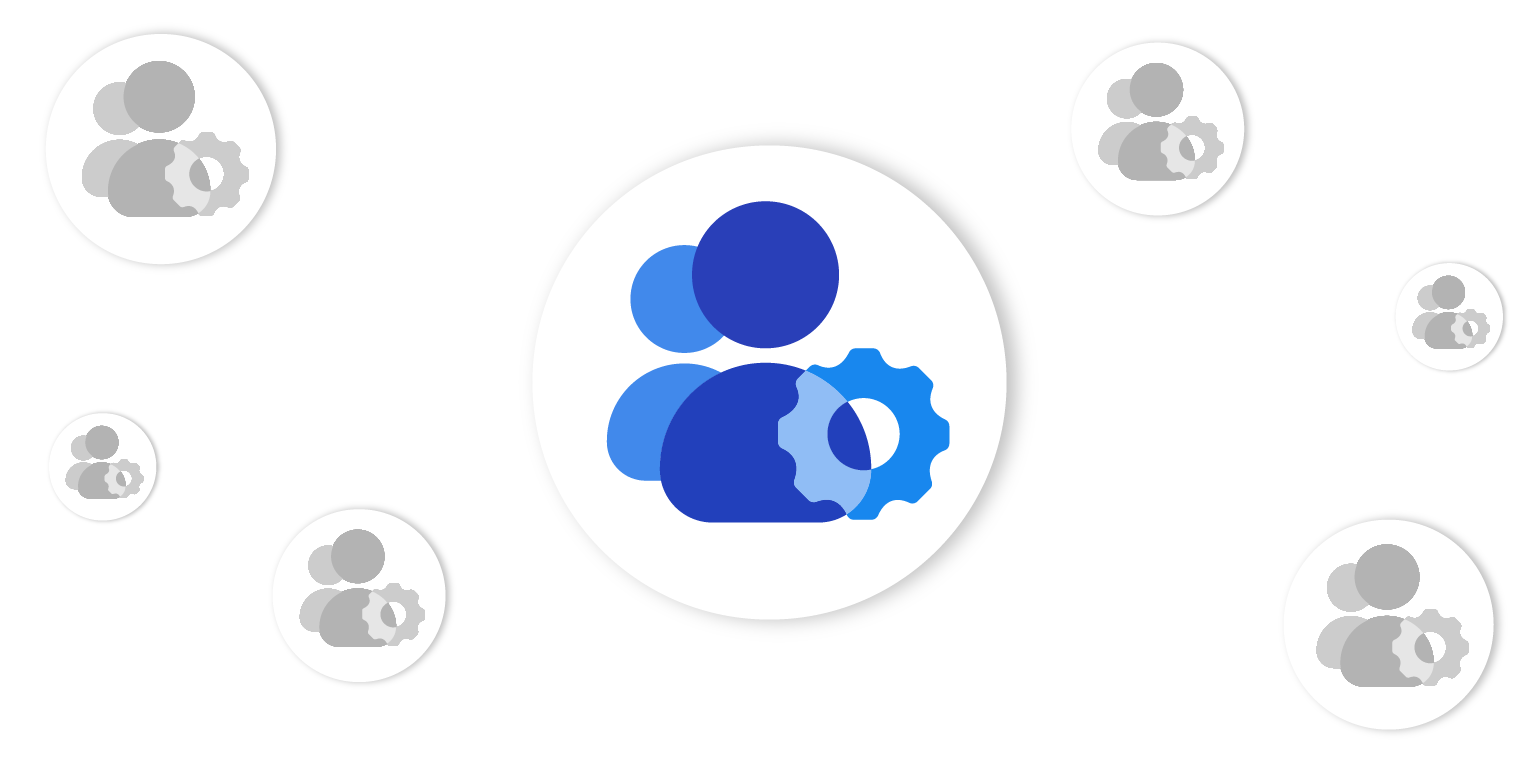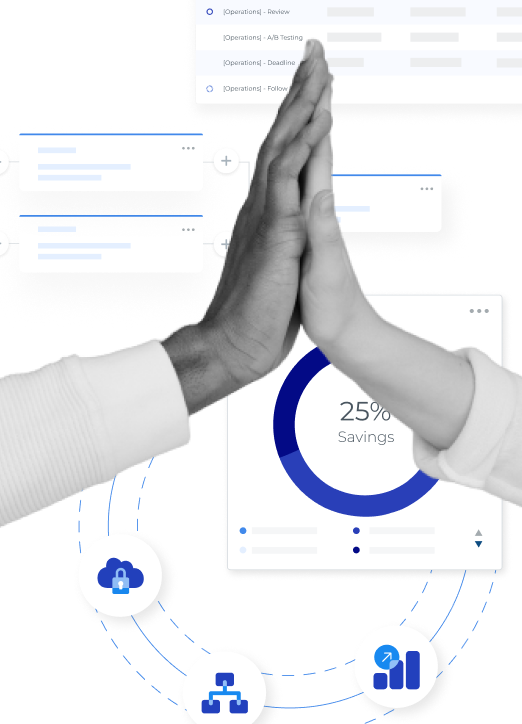Struggling with declining sales and chaotic business operations?
Then it’s time to start thinking about CRM automation.
It’s a transformative tool designed to address these hurdles and drive businesses toward unparalleled success.
In this guide, we’ll look at CRM automation in detail and how it can transform your operations.
CRM Automation: The Basics
Customer relationship management (CRM) has seen a transformative shift over the years. Once a basic tool for tracking client interactions, CRM has evolved into a highly automated system that boosts efficiency and productivity.
Essentially, CRM automation refers to the use of technology to manage a company’s relationships and interactions with potential and existing customers. But it isn’t just about technological automation; it’s about improving business strategies and customer satisfaction.
Originally, CRM was all about keeping track of customer details, much like an electronic Rolodex. It functioned more as a storage system than an active tool.
But as businesses grew and customer interactions became more complex, there came a demand for a more comprehensive tool. By the early 2000s, CRM systems moved from just managing contacts to combining sales, service, and marketing.
But why the move to automation? The answer lies in the exponential growth businesses have seen. As companies began to expand, manually entering data became tedious and error-prone because of the huge amounts of data.
This is where automation stepped in, streamlining processes, and ensuring data accuracy. It wasn’t just for managing data but also for forecasting sales, understanding customer behavior, and customizing marketing strategies.
In business, where the customer is king, CRM automation ensures every interaction is personalized, every lead is nurtured, and every opportunity is capitalized upon. It’s the bridge between businesses and customers, facilitating a relationship that’s not just transactional but transformative.
How Does CRM Automation Work?
Think of CRM automation as the brain behind your business operations, quietly working in the background. It captures every customer interaction, whether it’s an email, a purchase, or a casual website visit. Post-capture, it meticulously analyzes these interactions to provide insights into customer behavior, preferences, and patterns.
But here’s where its true power lies instead of merely providing a historical account, CRM automation uses this data to predict future customer actions. By doing so, businesses can anticipate needs, tailor offerings, and engage customers more effectively.
This proactive approach ensures businesses aren’t just reacting to customer needs but anticipating and addressing them before they arise, leading to a better customer experience.
Major Benefits of CRM Automation
CRM automation is sweeping the business arena, and for good reasons. Here’s an in-depth look at its many advantages:
Streamlined Processes
Remember the hours spent on monotonous tasks? CRM automation eliminates them. By taking over routine tasks, it frees teams to focus on value-driven activities. This not only saves time but also ensures resources are used where they’re most needed.
Increased Sales
Time is of the essence in sales. With CRM automation, businesses benefit from real-time data, leading to quicker decision-making and responses to customer queries. The ability to track leads efficiently translates to closing deals faster, driving sales numbers up.
Enhanced Customer Satisfaction
CRM automation focuses on creating personalized experiences for customers using their data. This strengthens relationships and makes customers more loyal and satisfied.
Better Lead Management
In sales, every lead is a potential goldmine. CRM automation ensures that from the moment a lead enters the system to its conversion, every step is tracked and optimized. This ensures no potential customer goes unnoticed or unattended.
Data Accuracy
Human errors, though unintentional, can have detrimental effects on decision-making. Automated data entry minimizes these errors, ensuring businesses have access to precise and consistent data. This accuracy is crucial in making informed, strategic decisions.
Potential Challenges Associated with CRM Automation
No system, however advanced, is without its challenges. Before diving headfirst into CRM automation, businesses should be aware of a few roadblocks:
Initial Costs
Quality often comes at a price. Robust CRM systems might have a steeper price tag, both in terms of software acquisition and training costs. This initial expense, while beneficial in the long run, could strain the finances of smaller businesses or start-ups.
Over-reliance on Technology
There’s a fine line between automation aiding human efforts and replacing them. Over-automating might lead to a loss of personal touchpoints that many customers value. It’s important to strike a balance, ensuring that technology enhances human interactions rather than completely replacing them.
Resistance to Change
Change can be daunting, especially concerning one’s work routines. Employees might view automation with skepticism, fearing it might make their roles obsolete. Additionally, there’s the challenge of getting the entire team acquainted with the new system, which might face initial resistance because of its unfamiliar nature.
Thus, while CRM automation is transformative, businesses need to tread with caution. A thoughtful and inclusive implementation strategy, keeping in mind both the technological and human aspects, is key to harnessing its full potential without facing setbacks.
CRM Automation vs. Marketing Automation
Both CRM and marketing automation software are critical in today’s business landscape, yet they have distinct functionalities.
CRM Automation Software
CRM automation software plays a key role in managing and analyzing a company’s interactions with its existing and potential customers. It helps nurture these relationships, ensuring the company remains top of mind.
Unique Features of CRM Automation Software
Here’s a closer look at some of its features:
Lead and Contact Management
One of the core functions of CRM software is its ability to effectively manage leads and contacts. This allows businesses to track potential customers and convert them into established contacts once they show interest or make a purchase.
By systematically categorizing and scoring leads based on interest or value, businesses can focus on the most promising ones. Moreover, a robust contact management system provides a comprehensive view of customers, capturing every interaction, preference, and purchase history, making future engagements more informed and personalized.
Document Management
Storing, accessing, and sharing important documents is made seamless with CRM’s document management feature. Whether it’s a sales contract, a customer’s purchase history, or even marketing materials, CRM ensures relevant team members can easily find and use these documents, reducing discrepancies and miscommunication.
Reporting & Analytics
With CRM’s reporting and analytics features, businesses are empowered with valuable insights. These tools allow a deep dive into customer behaviors, sales trends, and marketing campaign effectiveness.
Through easy-to-understand dashboards and detailed reports, businesses can measure their success and plan better strategies that resonate with their target audience. Predictive analytics takes this further by predicting future trends based on past data, enabling proactive decision-making.
Integration
For modern businesses, a CRM that can’t integrate with other software is a setback. Its integration feature allows it to seamlessly sync with other tools, such as marketing software, email platforms, social media channels, or even ERP systems. This ensures consistent data across platforms, simplifies data transfers and reduces manual inputs.
Automated Workflows
Another transformative feature of CRM software is its ability to automate workflows. Businesses often have processes that involve multiple steps, from lead capture to nurturing to conversion.
Automated workflows ensure that once a specific action is taken (like a lead downloading a document), subsequent steps (like sending a follow-up email) are automatically triggered. These speeds up processes and ensures no potential customer engagement opportunity is missed.
Marketing Automation Software
This software focuses on automating marketing-related tasks. It’s the backbone for businesses looking to generate leads, convert them, and measure the success of their marketing strategies.
Unique Features of Marketing Automation Software
Let’s explore its capabilities.
Campaign Management
This is the center of marketing automation. With campaign management tools, businesses can design, run, and monitor marketing campaigns across multiple platforms like email, social media, or the web. Moreover, real-time analytics help marketers fine-tune campaigns for better audience engagement and conversion.
Landing Page Creation
The first impression matters. With intuitive drag-and-drop builders and pre-designed templates, businesses can quickly create effective landing pages designed to convert visitors. Features like A/B testing help identify what resonates best with the audience.
Email Marketing
A staple in the digital marketer’s toolkit, this feature streamlines designing, scheduling, and sending targeted email campaigns. Advanced tools even segment audiences based on behavior or preferences, ensuring each email is personalized for maximum impact.
Plus, with analytics, marketers can measure open rates, click-through rates, and conversions, refining their strategies over time.
Lead Scoring
Not all leads are created equal. Lead scoring tools assign numerical values to each lead based on engagement or demographics. This allows marketing and sales teams to prioritize leads with a higher likelihood of conversion, optimizing resource allocation.
ROI Tracking
ROI tracking tools provide a clear picture of which marketing channels, campaigns, or strategies deliver the best bang for the buck. This data helps businesses allocate funds and efforts toward high-performing initiatives.
While CRM automation excels in nurturing and managing existing customer relationships, marketing automation is focused on the initial stages of the customer journey – attracting, engaging, and converting leads. Together, these two offer a comprehensive approach to gaining and retaining customers, which is crucial for business growth.
Top Picks for CRM Automation Software
Now, let’s briefly touch on some of the market’s big players.
Hubspot
Hubspot offers tools that integrate marketing, sales, and service functionalities. It aims to assist businesses in lead generation, conversion, and customer service.
Salesforce
Salesforce is a cloud-based platform that caters to diverse business needs, from start-ups to established enterprises. Its features encompass sales, service, marketing, and more, allowing businesses to tailor the platform to their needs.
Microsoft Dynamics 365
Microsoft’s offering in the CRM domain combines both CRM and ERP capabilities. It offers a range of integrated business apps designed to improve customer engagement, operational efficiency, and financial performance.
Pipedrive
Pipedrive is designed to assist sales teams in efficiently managing leads and closing deals. With features like deal tracking and pipeline management, it ensures sales processes are streamlined and effective.
Kizen
When it comes to CRM automation software, Kizen sets new standards of functionality, efficiency, and adaptability. Here’s a closer look at our unique offerings:
Custom Enterprise Neural Network Integration
Kizen crafts a custom enterprise neural network for each client to integrate all their critical technology and data. This enables unprecedented automation and collaboration across teams, ensuring businesses can squeeze every dollar out of their costly tech investments.
Rapid Deployment
Quick implementation is crucial. With Kizen, businesses can expect to see value in weeks that would traditionally require months. Moreover, we fully deploy in under six months, even for clients with complex or sensitive projects.
Revolutionary User Experience
Kizen transforms users’ capabilities through revolutionary modular infrastructure and intuitive no-code drag & drop tools. This infrastructure is purpose-built to handle today’s advanced data challenges and integrate seamlessly with existing applications across your organization.
Unlike legacy solutions, Kizen clients get cutting-edge software that safeguards their business against the relentless tide of technological evolution.
How to Choose the Best CRM Software
With so much software available, finding the perfect CRM fit for your business can be challenging. Here’s our simple guide to help you find one that aligns with your needs:
Understand your business needs
Before exploring CRM options, take a step back and assess your business requirements. Are you a B2B or B2C entity? Does the CRM cater to the nuances of your industry? Remember, a generic solution might not address the specific challenges your business faces. A CRM tailored for retail might not be the best fit for a financial institution.
Ensure the software is user-friendly
A CRM, regardless of its capabilities, is useless if your team finds it cumbersome. Opt for a CRM that has an intuitive interface for quicker adoption and, by extension, quicker returns on your investment.
Integration capabilities
Your CRM should seamlessly integrate with your existing tools and systems, be it your email platforms, marketing automation tools, or accounting software. Integration not only streamlines operations but also ensures data consistency across all platforms.
Look for customization
Your business is unique, and your CRM should mirror that. Customization ensures the software aligns perfectly with your operational processes.
Ultimately, selecting the perfect CRM software is less about the bells and whistles and more about its alignment with your business’s needs and processes. Choose wisely, and you’ll have a tool that not only streamlines your operations but also drives business growth.
Take Your CRM to the Next Level
Throughout our discussion, we’ve highlighted the powerful role of CRM automation in modern business. It’s an invaluable asset helping businesses improve their sales, marketing, and customer relations and significantly boost profitability.
If you’re ready to harness the potential of CRM automation, get started with Kizen. With us by your side, you’re not only adopting a cutting-edge solution but also ensuring a dynamic, responsive approach to business. Reach out to us today.



